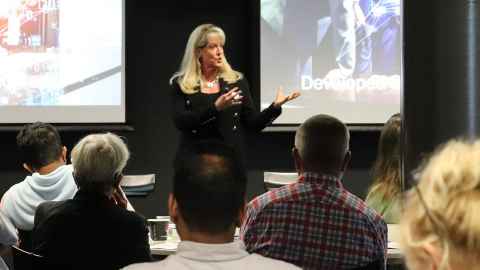CODE fundamental for our future
18 February 2021
The Centre of Digital Enterprise (CODE) has been officially relaunched at the University of Auckland Business School, to an audience of prominent business leaders, academics, and researchers.

The Centre has been established to research the application of digital technologies on business organisations - the adoption of which is seen as fundamental to New Zealand’s future.
Advances in technology and digital innovation is impacting the world. It is also one of the mega trends identified in the draft of the University of Auckland’s Vision and Strategy for the next decade 2021–2030, Taumata Teitei, and is an area where the University believes it can make a big difference.
During her introduction, the Associate Dean of Research Snejina Michailova referenced Taumata Teitei, which can be interpreted from te reo Māori as pursuing excellence, despite uncertainty, saying “CODE was fundamental for our future.”
Quoting from the draft document she said, “Opportunities abound for automated, intelligent and distributed systems to revolutionise society and economies, and transform the human condition.”
“Such transformations have impacts beyond economic production, reaching into lifestyle, workplace relationships and family formation. We will embrace the confluence between human practices and digital capabilities to enable the fair and ethical development, application and distribution of innovations. This requires our University to engage in wide-ranging and entrepreneurial responses…”
Addressing the crowd, Professor Ilan Oshri as the Centre’s Director, invited the audience to consider ways they could work with CODE.
“We must all strive to understand the relationships between digital technologies, business and society,” he said.
“The Centre is working with industry partners, policy makers, and media to facilitate knowledge and shape practices. CODE will actively develop educational programmes around robotic process automation (RPA) - software tools that partially or fully automate human activities, blockchain - decentralised, distributed ledger technology, and managing artificial intelligence (AI) etc.”
The event featured Jennifer Sepull, the Chief Digital Officer at Air New Zealand, as the keynote speaker discussing the role of digital transformation in challenging times.
With two thirds of Air New Zealand’s previous business servicing international travel, the impact of Covid-19 forced the company to operate in survival mode.
“We knew the pandemic was here to stay so we used the opportunity to clean up our digital operations to be more flexible,” says Sepull.
“We evaluated every part of the business and then we aligned digital to this. We used the pandemic as an opportunity to change our self in the market place, to become a digital airline, and to invest in digital. It is a bold decision, but it is what is going to make us successful in the future,” she said.
The final part of the programme was a panel discussion featuring Tony Bullen, the Chief Technology Officer of StayinFront, with Jason Mangan, the Chief Technology Officer from the University of Auckland, and Professor Michael Myers, from the Business School.
They all spoke of the key challenges they faced in the next 12-15 months as well as the opportunities. Attracting and retaining digital talent, in an area of the workforce that is highly mobile was an issue, including the difficulty with recruiting talent from overseas.
The need for education that provided digital dexterity as well as the urgent issue with an increasing digital divide – both socioeconomic and age-related were discussed.
To find out more visit the Centre of Digital Enterprise.
Media queries
Miranda Playfair | Media Adviser
Mob 021 063 8393
Email m.playfair@auckland.ac.nz